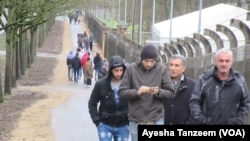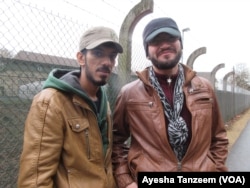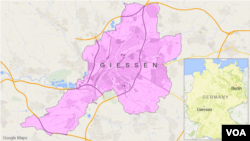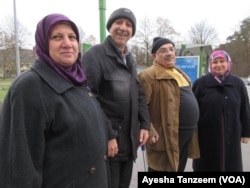Syrian migrants living in a camp in the German town of Giessen say the Paris attacks have not changed the attitudes of local Germans toward them.
While a few people reported incidents of minor harassment, most people seemed happy with the way the local community has accepted them.
Abdul Hameed Omar stood at a bus station outside Rodgön, one of the largest camps set up for Syrian and other migrants in Giessen. While he complained about facilities and services inside the camp, out on the street people were nice to him, he said.
'Everything is good'
“Everything is good here,” said Mahmood Hasan from Kobani, Syria, who arrived in Germany a month ago with his family.
After spending two months in Germany, Ahmad Hamdan found people’s behavior toward him to be “average, neither good nor bad.”
The Paris attacks did not change anything, he said. “People still laugh with us.”
Random checks
He was returning to the camp Thursday with his friend, Abdulnasir Tahir, after a trip to the city. Both men said that while they had not noticed a change in the city, inside the camp security checks have increased.
“Early morning, police randomly check only for Syrian people, to see whether they are in their room,” said Hamdan.
“When two Syrian brothers come together, Germans send one brother to one camp and the other to another camp in a different city,” he added.
Another young man from Syria, Issam Hanush, liked the way he was treated. “Good Germany,” he said in his broken English.
His friend Fahad Nasr agreed, but said that the way some people looked at him made him feel that they were afraid of him.
Aya, a young woman from Aleppo, Syria, who wore a hijab, experienced more than just weary looks.
Some fear
The day after the Paris attacks, as she was visiting the city center in the afternoon with her brother, an old woman walking her dog became so afraid upon seeing her that she ran away leaving the dog behind.
“It’s usual,” she said “I know what the woman was thinking – that I am from Daesh or something.”
In another incident, the driver of a local bus told her that he did not want her there and she should go back to her country.
Most people, she said, think women wearing hijab belong to a terrorist group.
She started spending most of her time in the camp and avoided going to the city.
Unlike Aya, Heba, a student of Arabic literature, who did not give her last name, also wore a hijab, but had not experienced any harassment. “The German people are very good. Things here are better than I expected,” she said.
Most Syrians in Giessen did not think the attacks in Paris would have an impact on them. They were afraid, however, that the journey to Germany would become more difficult for their friends and family that were left behind.







